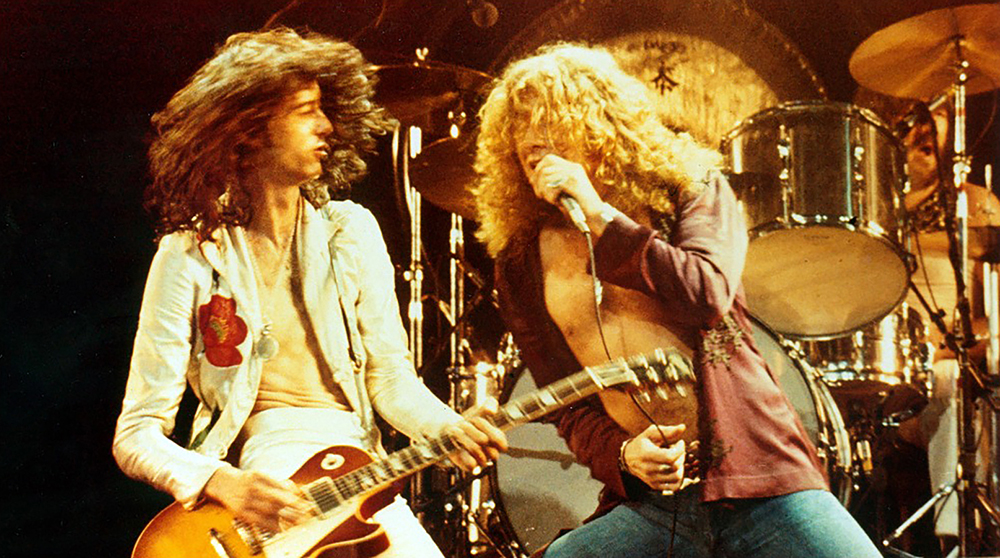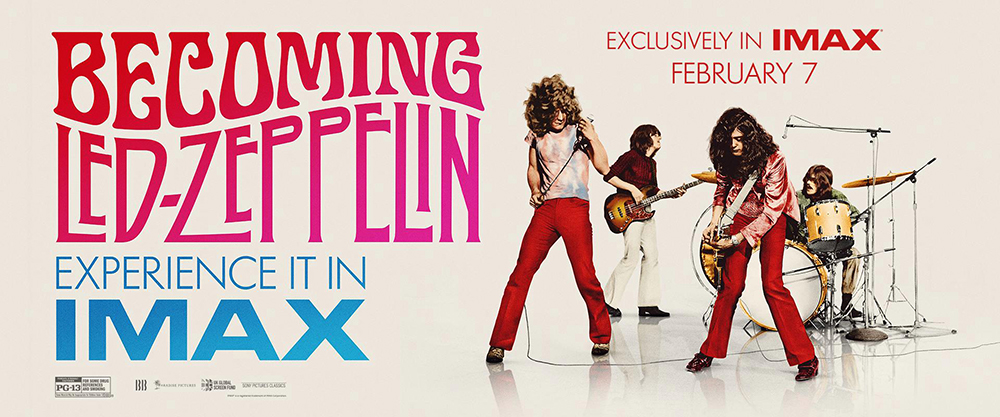Given the oodles of gushing praise for the band written over the last half century, it’s kind of hard to believe that Rolling Stone’s music critics absolutely hated Led Zeppelin. “Dull and repetitious” is how the house organ of rock-and-roll described their 1968 debut album. It continued on like that for the better part of a decade, with reviewers going out of their way to trash records that are now unassailable castles in rock Valhalla.
There’s a lot of critical stuff you can say about Led Zeppelin. They had some good songs, but their legions of mediocre imitators over the years have soured their reputation. The issue of cultural appropriation in the popular music of the 20th century is often very fraught and complex, but in the case of Led Zeppelin, it’s pretty cut and dried. Jimmy Page heard Chicago electric blues and said, “Do that, but louder.” As Page says in Becoming Led Zeppelin, the music he heard as a teenager in the quiet Midlands of England “sounded like it was coming from Mars, but really it was coming from Memphis.”
But I think what really bothered those Rolling Stone writers was that Zep was never considered “authentic.” Of the four members — guitarist Jimmy Page, drummer John Bonham, singer Robert Plant, and bassist John Paul Jones — only Plant was “from the street.” Plant says he was living out of a brown suitcase, drifting from gig to gig when Jones invited him to his house for an audition.

Page and Jones had both been session musicians in London for years before the Zeppelin took flight. One of the things I learned from Becoming Led Zeppelin is that they met while on the session for the James Bond theme “Goldfinger.” Yes, that’s half of Led Zeppelin playing smooth jazz behind Shirley Bassey. Later, Page backed Donovan, the psychedelic folkie who was Bob Dylan’s nemesis.
For me, it’s revelations like that which make the first hour of Becoming Led Zeppelin a fairly gripping watch. Director Bernard MacMahon made his name in the documentary world with the BBC miniseries American Epic. Those four films traced the lasting influence of recorded music on democracy. His assignment here is a little simpler: Tell everyone how awesome Led Zeppelin was, in their own words.
And how awesome were they? Pretty damn awesome. MacMahon unearths some stunning footage from the band’s early years. Some of it has been widely seen before, like the Yardbirds cameo in Michelangelo Antonioni’s Blow-Up. Page joined the Yardbirds as a side gig when Jeff Beck got sick, and then stayed with the band until they broke up in 1968.
MacMahon does a good job keeping the famously bombastic band sticking to the facts of the story. Then Page describes the guitar that Jeff Beck gave him, which stayed with him throughout the band’s career, as “the great sword Excalibur.”
It’s also possible that Rolling Stone’s hatred of Zep stems from Page coming off as the bad guy who had hijacked the beloved Yardbirds, a narrative which is not even hinted at in Becoming Led Zeppelin. And yet we know those early reviews still sting because the film devotes quite a bit of screen time to detailing the pains. Time has clearly been on Jimmy Page’s side in this argument. To hear him tell it, he didn’t care about what the critics said because he didn’t have to. When the Yardbirds split up, he paid for Led Zeppelin’s debut record out of pocket. Jones shocked his friends and family by giving up a steady paycheck as an in-demand commercial music arranger and joining Page to make loud rock. Plant passed his audition by singing a folk song popularized by Joan Baez, “Babe I’m Gonna Leave You,” and insisted they get Bonham to play drums. Bonham agreed, if they could match the 40 quid a week he was making with his current band. After a short European tour as The New Yardbirds, that proved to be no problem. The Who’s drummer Keith Moon suggested the name Led Zeppelin about the same time Page took them into the studio.
To anyone familiar with the horrors of the recording industry, the next part of the story is the most shocking. Page took the completed master tapes to New York City to pitch directly to Atlantic Records’ Grand Poobah Jerry Wexler and secured a contract giving him complete creative control. As I do in many of the documentaries about Boomer-era musical legends, I found myself thinking, “Wow, the biggest difference between them and the also-rans is that they had really good lawyers.”
Page, the longtime studio rat, had plenty of time to absorb how the industry worked, and when his time came,“I knew what we had, and I wanted to knock everyone’s socks off with it,” he says.
The recordings speak for themselves, and for a big chunk of the film’s second hour, MacMahon allows them to do just that. Seemingly every time the band was in front of a camera from 1968 to ’70 is in this film. Veteran editor Daniel Gitlin makes the most out of the wildly variable film quality. Finally, in the climactic “Whole Lotta Love” sequence, he gives the film over to the kind of psychedelia the band was so deeply associated with in the 1970s. These “laser Zeppelin at the planetarium” bits hit pretty hard, while bearing the clear influence of the incredible Bowie doc Moonage Daydream. But Becoming Led Zeppelin never climbs to that film’s artistic heights. We get only the band’s perspective, which in this case means quite a bit of whitewashing. Even though their tours were notoriously decadent, Plant only mentions drugs once, in passing. So if you’re looking for dirt, it ain’t here. But if you’re looking for thunderous riffs delivered on a giant Dolby sound system, Becoming Led Zeppelin’s got ’em.
Becoming Led Zeppelin
Now playing
Select Malco theaters
